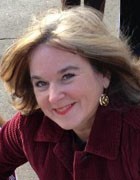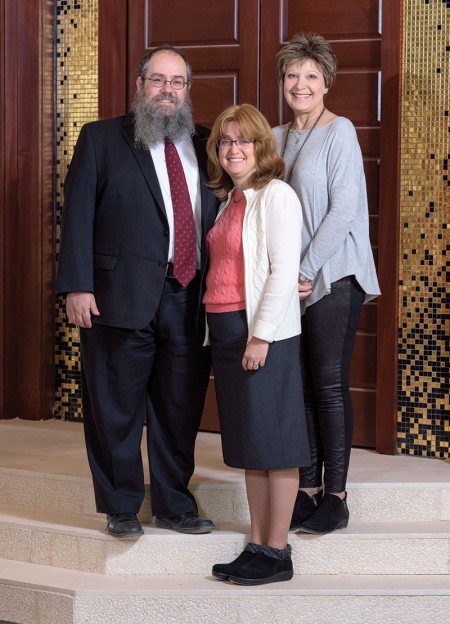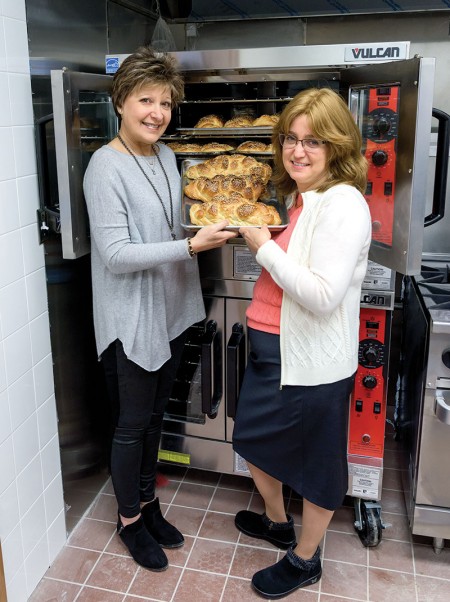A House of Hope
Patients find a home at Aishel House


ALL IN FOR AISHEL HOUSE Aishel House founders Rabbi Lazer Lazaroff, wife Rochel and Volunteer of the Year Ellen Kleinman (right) are all smiles in the new hospitality center’s synagogue. (Photo: georgefloresphotography.com)
The prognosis was grim. Malignant cells in Robert Villarreal’s right kidney had led a virulent march up the body’s largest vein, the inferior vena cava, depositing a nasty clump of cancer just inches from his heart.
Stage 4 kidney cancer. Six months to live.
With a referral to MD Anderson Cancer Center, the retired Albuquerque marine piled into his Ford Expedition, wife Dannette and two grown children in tow, and headed to Houston with a prayer on his lips and scarcely enough money for a three-day stay.
“Please just give me some medicine to make me live another year or two. I don’t want to die in six months,” he remembers thinking. But doctors had other plans.
They wanted to cut him open from collarbone to pelvis to excise the lethal tumor. There was an 80 percent chance he’d die during the procedure, the surgeon said. But without it the wolf would most certainly be knocking at his door. Surgery was scheduled 22 days out.
“We had hardly any money left for food and lodging. I thought we might have to sleep in our car,” Robert says, his voice cracking with emotion. “I’m a retired veteran on a pension. I didn’t know what to do.”
Fortunately for the family, Rabbi Lazer Lazaroff and wife Rochel of West University offer up accommodations, warm meals, transportation and a myriad of other services through their benevolent brainchild, Aishel House, a non-profit hospitality center that aims to ease the emotional and financial burden of the ill undergoing treatment.
“Aishel is a Jewish term that touches on the specific tradition of hospitality that we get from Abraham in the Bible,” explains the rabbi.
To Robert and kin, it was a godsend.
“Their number was on a list my wife got from MD Anderson, and we stayed there before my surgery and after for several weeks,” explains Robert, 70, now five years cancer-free. “I came to Houston with a death sentence and left with a new lease on life. Aishel House was our family.”
And that, say its founders, is the point.
“Aishel House should feel like home,” says Lazer, giving a tour of the new Aishel House building at 1955 University Blvd., slated to open late this month. Every feature of this state-of-the-art, 23-apartment unit center, designed by Houston architect Mark Mucasey, is built to express a warm, restful refuge from the clinical hustle and bustle of a hospital.
“When people feel lost in a desert, they need a place to revive their soul,” says Rochel, whose passion for their cause is as palpable as her warm, homemade challah bread.
“It was built on a million little miracles and donations,” Lazer says of the building, named for Houston philanthropist Barbara Hines, who made a generous donation. “She’s a dear friend. She developed a very close relationship to the cause and saw what people were going through.”

A TASTE OF HOME Guests at Aishel House are in for a treat, Rochel Lazaroff’s scrumptious challah bread. Volunteer Ellen Kleinman (left) and Rochel show off the tasty concoction in the center’s state-of-the-art kitchen. (Photo: georgefloresphotography.com)
With comfortable lounges, a synagogue, dining room, playroom for babysitting, activity room and two kitchens (one for staff and volunteers), the center assures a community feel. All this and a courtyard view of gardens and a fountain. The only requirement of residents is that they be accompanied by a caregiver and pay $25 per day.
“Our biggest thing is we didn’t want Aishel House to feel like a house of sick people,” explains Lazer. “With that intention we created a few public spaces to give the community a gateway to come in, cook, sit and lounge, so that patients aren’t just with patients. Our volunteers are everything. It’s a real community. This building just hums with energy.”
Energy is something this couple knows a bit about.
With 11 children, ages 25 to 5, one might think they’re frazzled to the core. No, says Lazer. “They say if you need something done, give it to a busy person to do.”
The couple came to West University in 1992, moving into a small house on University Boulevard with their baby boy.
United in their passion to serve the Jewish community, they started a Chabad Center to provide spiritual support to students at Rice University. Lazer visited Jewish patients at MD Anderson, Texas Children’s Hospital, St. Luke’s and Methodist Hospital. He’d pass out Rochel’s delectable challah rolls on Friday’s Jewish Sabbath.
“We were bright-eyed and bushy-tailed,” Lazer quips. “We wanted to be of service to the community but didn’t exactly know what that would look like yet.”
Happy with a wide-eyed baby boy and another child on the way, Rochel wondered aloud how their healthy little family could offer hope and support to people who were struggling. “How will they relate to us?” she’d muse. “How are we going to comfort people?”
“But we received God’s internship pretty quickly,” says Lazer. Their baby girl, Chaya, was born with multiple congenital problems. They spent 11 months in and out of Texas Children’s Hospital until Chaya died.
“That child taught me a deep empathy for people, but not pity,” Rochel says. “Even in a dark place there can be a little light to ease the pain so you’re not alone. We understood that in a very real way after we experienced what we did with our daughter. We wanted to do more to help others who were struggling.”
On occasion, the two had met hospital patients in need of a place to stay. But the growing family had no room. Desperate to help, they bought an apartment to offer as temporary housing to one Jewish patient at a time. But demand was enormous.
Rochel would stand outside their house, point to a ramshackle, 18-unit apartment complex next-door and say, “Someday we will do something with that.”
The couple envisioned tearing down the eyesore and building a place for multiple patients. Years later, after deliberations with its owner and financial donations, it was theirs. But hope of a new facility was still years off.
From 2004 to 2014, they operated Aishel House in this rundown apartment complex and opened it up to anyone in need, not just the Jewish community. Lazer took clinical pastoral-education classes part-time for three years to transcend spiritual-language differences and better counsel the residents.
Volunteers fixed up the apartments one by one, painting and laying new floors, donating furniture. Residents were treated to Rochel’s delightful vegetable soup, challah bread and other concoctions. “She’s not a cook. She’s an artist with food,” Lazer says of his wife’s culinary skill.
Some volunteers helped with the cooking, took patients to doctor appointments, played cards with patients and families, relieved caregivers. Or just sat with them. A comforting ear.
To Rochel and Lazer’s children, volunteering at Aishel House was second nature, their heart.
“There was always a waiting list of 10 to 20 people even for those ugly, subpar apartments,” says Lazer, citing more than 60,000 nights of accommodations at that location. “Patients would tell us that social workers told them they’d be treated like family here.”
Fast-forward to today and the Lazaroffs are delighted to offer the new, modern setting for Aishel House guests. The building’s feel and beauty is appreciated more than words can convey, they say. But it’s the army of passionate volunteers that make it tick.
Bellaire resident Ellen Kleinman has been on both sides of Aishel House’s hospitality, as volunteer and patient.
“I want to be Rochel when I grow up,” quips the 56 year old, who was honored as Volunteer of the Year at a recent Aishel House fundraising gala. “She’s my hero.”
In recent years, Ellen, a congregant at Bellaire’s Brith Shalom, has been the recipient of Rochel’s kosher meals following surgeries for a rare thymus gland cancer.
“Her cooking is amazing,” says Ellen, who has spent the past 15 years, early on with children Alyssa, Jonathan and Mackenzie, volunteering for Aishel House projects. She’s delivered Rochel’s meals to hospital patients. For six weeks she happily drove a patient to appointments at the medical center.
“And now I’m the recipient of the wonderful things that Aishel House does,” says Ellen, now on a maintenance dose of chemotherapy.
“We are so incredibly blessed to have something like this in our community where people who are dealing with so much don’t have to worry about where to stay and, in some cases, where they can get a kosher meal. I think people from this community need their support as much as those coming from the outside. I don’t know that anyone realized what a void there was in the community until they started to fill it.”
The significance of Aishel House to Ellen and others is not lost on her children. For her Hanukkah present, they collected more than $1,000 in donations from friends to give to the center in Ellen’s name.
“My daughter talked to Rochel, and they decided to make the donation go toward the kitchen for pots and pans so that all the meals that come out of the kitchen can be made with love from me,” Ellen shares, stifling tears. “When I read the card signed by groups of their friends I could hardly speak, I was so emotional.”
That, says Rochel, is the miracle of Aishel House.
“It’s all about loving and caring for one another. It might be random people we meet and help and never see again. But please, we pray, may they leave here, live a long time and be well.”
To learn more or make a donation, visit www.aishelhouse.org.
Want more buzz like this? Sign up for our Morning Buzz emails.
To leave a comment, please log in or create an account with The Buzz Magazines, Disqus, Facebook, or Twitter. Or you may post as a guest.


